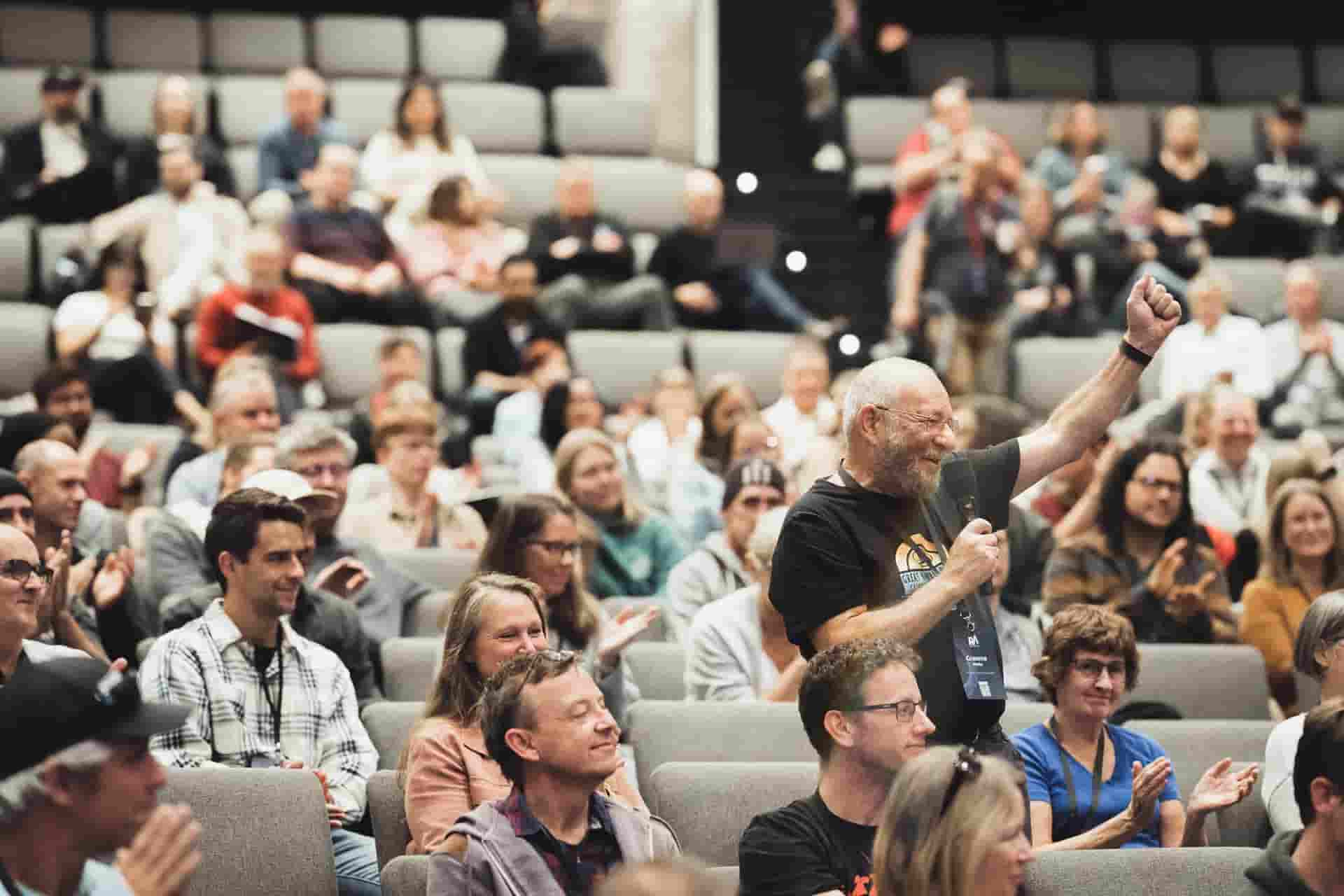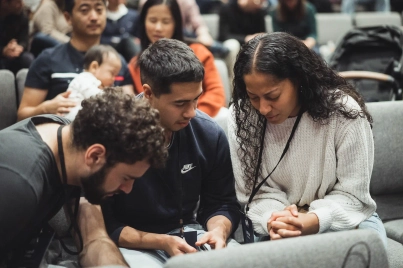There’s times when life falls apart and things just don’t turn out as we planned, and they’re often unexpected things that turn up that are not in your diary. It can be a matter of time before gospel workers are overwhelmed with requests and needs. How do we manage all this?
Sally Sims is the Care Ministry Coordinator at Christ Church, St Ives, on Sydney’s North Shore. She’s author of Together Through the Storm A Practical Guide to Christian Care and she sits down with Jo Gibbs to talk about how to care for people in church without being overwhelmed.
SHOW NOTES:
Sally’s Book can be found here. Watch for the 2nd Edition in August.
Care resource list from the Reach Australia National Conference
Sally’s workshop…coming soon.
Keep watching for more Reach Australia Resources
CREDITS:
The One Thing is brought to you by Reach Australia.
For ideas or questions please email [email protected]
TRANSCRIPT:
G’day I’m Jo Gibbs and welcome to The One Thing, a podcast designed to give you one solid practical tip for gospel centered ministry. Every week, the one things brought to you thanks to Reach Australia. We’d love to see thousands of healthy, evangelistic and multiplying churches now at our recent Reach Australia conference, we pushed into the area of care in our churches and I’m pretty excited to be chatting to our guests today. Sally Sims Welcome, Sally.
Thanks, Jo.
Sally’s the Care Ministry Coordinator at Christ Church, St Ives, on Sydney’s North Shore. She’s author of Together Through the Storm A Practical Guide to Christian Care. From Matthias Media, second Edition coming out in August. Yep. Yep. And while I was the Care Minister at St Paul’s at Castle Hill, I had Sally on speed dial for pretty much all of my tricky questions about care. You saved me more than once, Sally. So it’s great to have you here on the one thing today. Great to be here, Jo. But for now, you’ve press play on another episode of The One Thing I’m overwhelmed with care needs at my church. What should I do now? A regular part of church life is how we care for people.
There’s times when life falls apart and things just don’t turn out as we planned, and they’re often unexpected things that turn up that are not in your diary. The hospital visit to someone who ends up in hospital that week. Someone who grabs you before church to talk about a mental health concern or that unexpected funeral. And we’re working hard in ministry to be strategic and intentional and proactive and often responding to care needs feels really reactive, and we just don’t have space in our diaries for it. And if we don’t have structures in place to think about care ministry intentionally as those can come across our desk, they can feel really overwhelming. So I’m really excited about today’s topic because I think this is something that many pastors face. So first of all, Sally, can you tell us how did you get involved in this area of ministry in the first place? Why not another area of ministry?
Hmm. Well, I’ve got a background in nursing and this education, and so I’ve always been drawn towards caring. But it wasn’t until 2007 when I did a 40 hour clinical pastoral education course that was being run at church, that I felt myself being drawn more into care ministry at church. And then in 2009, I was praying that God would direct me to what area that I could be serving in the following year. And the next day I bumped into our senior minister and he said, Come and have a chat, Sally, what are you going to be doing next year? And it turned out that they were looking for someone to help set up the pastoral care ministry at church. And so I joined a small team of people in 2009, have been part of that team ever since. And in 2017, I joined the staff as an honorary volunteer, as the care ministry co-ordinator. And so I often reflect and give thanks to God that he never wasted my nurse training. You know, he steered me towards care ministry and I was able to use a skills and I’ve learned lots of others along the way. Yeah, a great preparation for ministry.
Love God’s timing with that conversation with you, a senior minister. And when you started out in care ministry, what was it like? Was overwhelming the word that you would have used something else?
It was it really was, because Christchurch is a large church and there are lots of needs. And so it was really difficult to know where to start. And initially the big question for us was, well, what is the role of the care ministry in a church like ours and where does it fit in with growth groups being the engine room of care and also with the pastoral oversight of ministers? So yeah, after prayer and discussion, we decided that the role of Care ministry would be to provide additional care beyond the capacity of growth groups, so additional crisis and chronic care when growth groups couldn’t meet the needs of people in in their groups, and also that it was important to provide training and equipping in care. So it’s taken time to work it all out. And care ministry is still evolving and developing at Christchurch and it sounds like some really helpful conversations to get clarity about what you would do, what you wouldn’t do, how it would fit in with your existing structures.
So really good to have those conversations as it’s developed. Now when we talk about care, what sort of things are we talking about? Can you give us some examples?
Yeah, well I think if we’re to love one another, well, our first thing must be to listen well and then to be able to respond with empathy and not give simple platitudes. So that’s really key. We’ll always want to be praying for and with others who are going through a difficult time. But there’s lots of way we can show that we care for people. There can be small acts of kindness like sending a bunch of flowers or a text. There can be visiting somebody who’s in aged care or in hospital or at home, you know. And of course, we will want to read the Bible with one another wherever we can or encourage one another with God’s Word. So those are some examples.
But really, you know, there’s so many different ways we can show care for one another. Yeah. And so encouraging that all of those are things that all of us can do.
Yeah, they don’t they’re not extravagant gestures. They’re not things that require a lot of resources. They’re all things that we can be involved in doing. Now, if someone’s listening and they’re feeling overwhelmed by the number of care needs in their church, where should they start thinking about all of this? Where should they start?
Yeah, well, I think it’s really important to actually stop. You know, if you’re feeling overwhelmed, it’s no good keeping on, keeping on with the same stuff. You need to stop. You need to take time to assess how is care actually happening at church, How can needs being met and to to pray about it and to reflect, you know, all growth groups providing care for people? And how well are they doing this? You know, all the leaders receiving training, are they well-supported? Do they know what their role is? Do they know how to escalate care needs when those needs go beyond their ability and capacity in the group? And we want to be building a culture of care. So we really need to have Bible teaching. That’s helping people be aware of things like the one another commands. You know, those are not just nice suggestions of things to do, they’re actually commands and also we’ll need to be keeping talking about difficult topics. And I’m thinking of topics like mental ill health, divorce, same sex attraction. These need to be talked about openly from the front so that members know what the Bible says about these topics and also how we can support one another in these kind of situations. So part of that stopping will be thinking about praying about, you know, what additional structures and processes could we put in place in our church that would make a difference? And also to look around and think, is there a member of staff or a volunteer or someone who could oversee care and set up a care team if necessary
Sally Great that you talked about small groups being the engine room of care and people knowing what their role is in care. I was chatting to a pastor after national conference who sat through the care sessions and I was thinking to himself, Oh, our growth groups know that they’re the engine room of care. And then he pulled up the job description for the growth group leader, and there was nothing about care in there. And he thought, we really haven’t explained. We haven’t really been clear about everyone’s role in care. So it was a great, great thing for him to be thinking about and chatting to his team about as people are thinking about being feeling overwhelmed, backhands, any other things they should be thinking about.
I think it’s important that they actually stop and undergo a period of self-reflection and just think about are they clear about what their role is and what it isn’t. And, you know, that can be a tendency for us all to rush into a situation to try and rescue and fix people, to be the hero.
Yeah, exactly. And as Christians, we do want to show extraordinary love. But we need to remember we do this primarily through listening and through offering spiritual support and encouragement. Of course, we want to keep the whole person in view and we will want to help with physical or social needs that are there. But we want to make sure we’re always walking alongside people and empower them and encouraging them to take responsibility and to think for themselves in their current situation. We mustn’t over function and we mustn’t think that we’re the person Savior because only Jesus is. We certainly can’t carry at all, and neither should we try. We’ve got to keep casting our anxieties about those people on Jesus and praying for their situation with them and for them, and also the other important thing is not to try and do care. As a lone ranger, you really want to mobilize all the people who can step in and help care for that person. It’s a team effort as we care for one another and each person will bring something, you know, slightly different, but so important that we know our limits. We know what we can do and what we can’t do for someone, and then we know who to refer them to.IIf it goes beyond our expertise, we really need to have good boundaries in this situation and not go beyond them. Because although were called to show sacrificial love is always got to be sustained.
Yeah, and you can imagine if you’re in a church with an overwhelming number of care needs, he carrying that all yourself. If you’re not relying on God, if you’re not taking a team approach, that would become a weight or a burden. And that’s too heavy for a person to carry. And he could imagine things like burnout. A good reminder as well about Lauren Errington’s workshop. She did a conference about over functioning in the area of care. I think that’s something we’re all trying to do. Yeah, So great for people to have a listen to that. You’ve already touched on some really practical things that people can be thinking about, but if someone’s at a church and they’ve got nothing in place at the moment, where should they get started?
Because there’s so many different things they could do. One of the priorities at the beginning? Well, I think it’s helpful to get a group of people together, men and women who are interested in care and care ministry. And some of these people might have a background in care or they just may be interested, but get a small group together and to prayerfully discuss how we can develop care at church and also at the same time to be thinking about, well, what are the care needs at our church, what’s working, what’s missing, and make a list of people who actually need at the current time in church. So that might be a list of elderly people with special needs or people in aged care. It might be families in crisis or individuals who are going through a hard time, and it could be young adults and mental health. Yeah, it could be all of those things and and be praying for them even as you’re working out, you know how to care for them. Now, hopefully all of those people are in a growth group, but some of those people definitely will have needs beyond the growth group and some of them probably won’t be in a growth group. When you think of only about 70% of a congregation is in a growth group, they’ll be people perhaps who aren’t being looked after as well as they could be. You always want to start small. Really important to think about, start small. The steps again have to be sustainable. And it might be that you just start with a prayer support group or male ministry if you haven’t got one or visiting people in hospital, if you haven’t got something like that. I think it’s really important to look for a potential care coordinator early on, someone with a conviction character and competence and a heart for care. They’ll need to have some admin skills as well, but they don’t need to have everything they can be learning and being trained as they go. You’ll want to think about, well, what would a basic care team structure look like at our church? And that’s going to be different perhaps for each church. So you really do need a clear vision of what you want to achieve, what’s feasible, and how you’re going to get it going. And this includes things like having a job description so that if there’s a care team, they need to know, the member needs to know what’s their role, what’s their hours and who’s going to support them. Yeah, and you know, if you’ve got a long list of care needs, then prioritize the people on the list and work out who can start being in contact with them. Of course, to training’s the other side of it. Training for growth. Good leaders and hopefully for members of church. And then they’ll need to be some kind of evaluation, ongoing evaluation and monitoring. Yeah, and I loved how the beginning you talked about having a group for people to come together and talk about it and pray, and I’m guessing some of those might become part of the ongoing care team as it sets up. Yes, that’s often the case. It was in our case, definitely.
Yeah. Sally, this has been incredibly helpful. You’ve given us some really practical things, places that we can get started. What’s the one thing you want to say about addressing care needs in your church? Important to remember the pastor can’t do it alone, so you really need to be intentional and plan how you’re going to put care structures in place and how you’re going to mobilize your people for care.
That’s great. Thanks so much.
Well, in the toolbox today, we’ve got heaps of great resources. We’ve got a link to Sally’s book Together through the Storm at Mathias Media. We’ve got a care resource list that was made available at national conference with some great resources on there. Also an encouragement to keep an eye out for Sally’s workshop that she did with Caroline Litchfield at National Conference and the other Care plenary talks that will gradually be available on the Reach Australia podcast.
Now if you’ve got a topic you’d like us to cover on, the one thing you can email us at [email protected]. Sally, it’s been really great chatting today. Thanks so much for coming in. Thanks for inviting me. Well, I’m Jo Gibbs. Chat soon.



